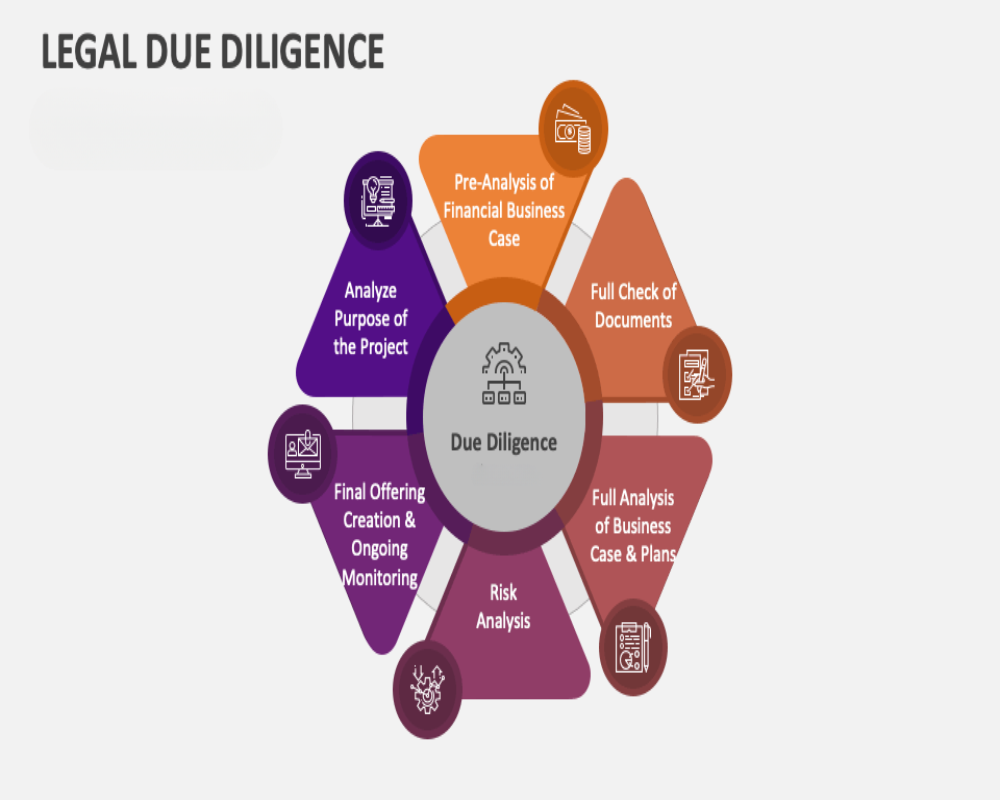Introduction
Legal due diligence is a systematic and thorough investigation of the legal status, history, and associated risks of a property, business, or asset before entering into a transaction. In the context of industrial land acquisition or business investments, legal due diligence plays a critical role in ensuring that the buyer or investor is fully informed about the legal rights, obligations, and liabilities attached to the target property or entity. This process helps prevent future disputes, financial loss, and regulatory complications by identifying and addressing legal red flags before the transaction is finalized.
Whether it’s acquiring a plot of land for an industrial unit, purchasing an operational facility, or entering into a joint venture, legal due diligence serves as a foundation for making informed, risk-managed decisions. It is an essential step for compliance, ownership verification, and transaction structuring.
Verification of Ownership and Title
One of the primary functions of legal due diligence is to confirm the legitimacy of ownership. It involves examining title deeds, sale agreements, succession records, and government land registries to ensure that the seller has clear, marketable, and transferable ownership rights. The investigation traces the chain of title to check for any gaps, errors, or irregularities that may compromise the legality of the transaction.
A clear title is crucial for avoiding future litigation, third-party claims, or challenges in transferring ownership. Legal due diligence also identifies co-ownerships, joint development agreements, or powers of attorney that may impact the seller’s authority to transact.
Identification of Encumbrances and Liabilities
Legal due diligence evaluates whether the property or asset is free from encumbrances, which may include mortgages, liens, leases, court orders, or unpaid dues. This involves reviewing the encumbrance certificate, pending litigations, financial liabilities, and government notices. Identifying such encumbrances early helps the buyer avoid assuming unforeseen debts or legal disputes.
In industrial acquisitions, liabilities may also include unpaid property taxes, environmental violations, or labor disputes that must be disclosed and resolved before closing the deal. A failure to recognize these issues can lead to operational interruptions and significant penalties post-acquisition.
Assessment of Regulatory Compliance
Ensuring that the property or business complies with local, state, and national laws is a core component of legal due diligence. For industrial projects, this includes verifying zoning approvals, land use permits, building code compliance, environmental clearances, and operational licenses. The legal team reviews documents from development authorities, pollution control boards, and industry regulators to ensure that the project can proceed without legal restrictions.
Non-compliance discovered during due diligence may require corrective action, renegotiation of deal terms, or in severe cases, termination of the transaction.
Contractual and Legal Obligations Review
In acquisitions involving existing businesses or operational industrial units, legal due diligence examines all material contracts, lease agreements, vendor contracts, employment agreements, and customer obligations. It checks for termination clauses, litigation risks, and change-of-control provisions that might affect the enforceability of these contracts after the transaction.
This review helps assess the legal sustainability of the business and avoids inheriting any unfavorable or risky contractual obligations.
Risk Mitigation and Deal Structuring
Legal due diligence provides a risk map that allows buyers to make informed decisions about deal structuring, pricing, and indemnities. Based on the findings, transaction documents can be drafted with appropriate representations, warranties, and indemnity clauses to protect the buyer’s interests. It also assists in deciding whether the purchase should be made as an asset acquisition or a share acquisition, based on liability exposure.
Additionally, legal due diligence informs negotiations. If significant legal risks are found, buyers may seek a price reduction, escrow arrangements, or conditions precedent to closing.
Supports Financing and Investor Confidence
Banks, financial institutions, and investors require legal due diligence reports before approving funding for land purchases, mergers, or business expansions. A comprehensive due diligence report gives them confidence that the transaction is legally sound, the asset is free from disputes, and the borrower has proper ownership and authority.
Without legal due diligence, lenders may refuse to finance the deal or impose strict conditions, delaying or derailing the transaction.
Conclusion
Legal due diligence is a critical pillar of any land acquisition, business transaction, or industrial investment. It ensures that the buyer or investor is not exposed to hidden legal risks and that the transaction proceeds in a compliant and legally secure manner. By verifying ownership, uncovering liabilities, checking compliance, and evaluating contractual risks, legal due diligence transforms uncertainty into clarity and enables risk-managed decision-making. In a regulatory and litigation-sensitive environment, skipping due diligence is not just risky—it is potentially damaging to the long-term viability and profitability of any industrial venture.
Hashtags
#LegalDueDiligence #DueDiligence #LegalAdvice #BusinessLaw #CorporateLaw #RiskManagement #LegalCompliance #MergersAndAcquisitions #InvestmentAnalysis #ContractReview #LegalResearch #BusinessTransactions #LegalConsulting #CorporateGovernance #LegalInsights #DueDiligenceProcess #LawFirm #LegalStrategy #BusinessGrowth #LegalEducation


